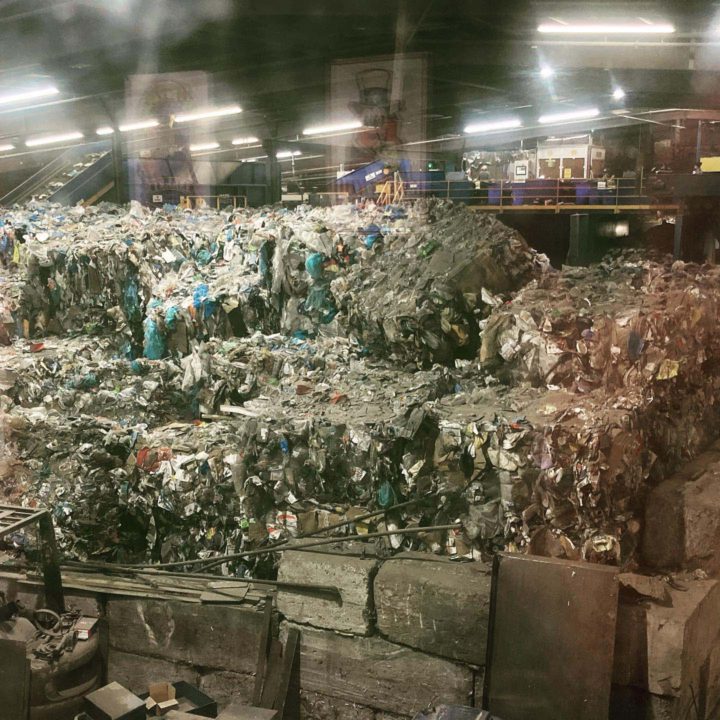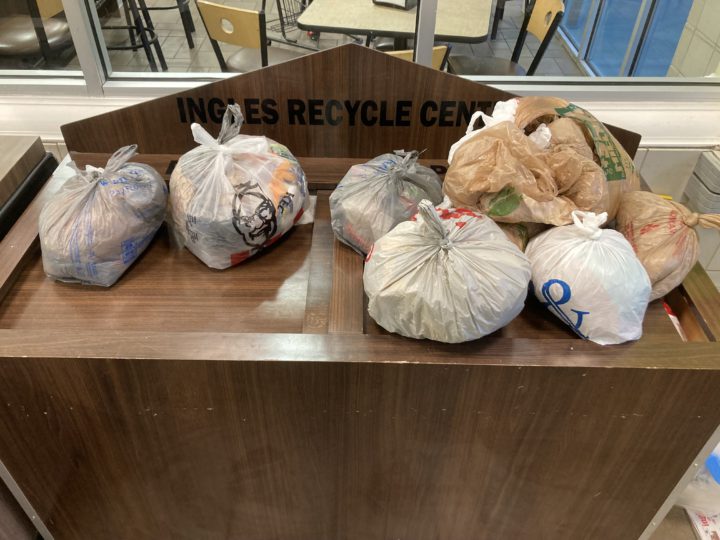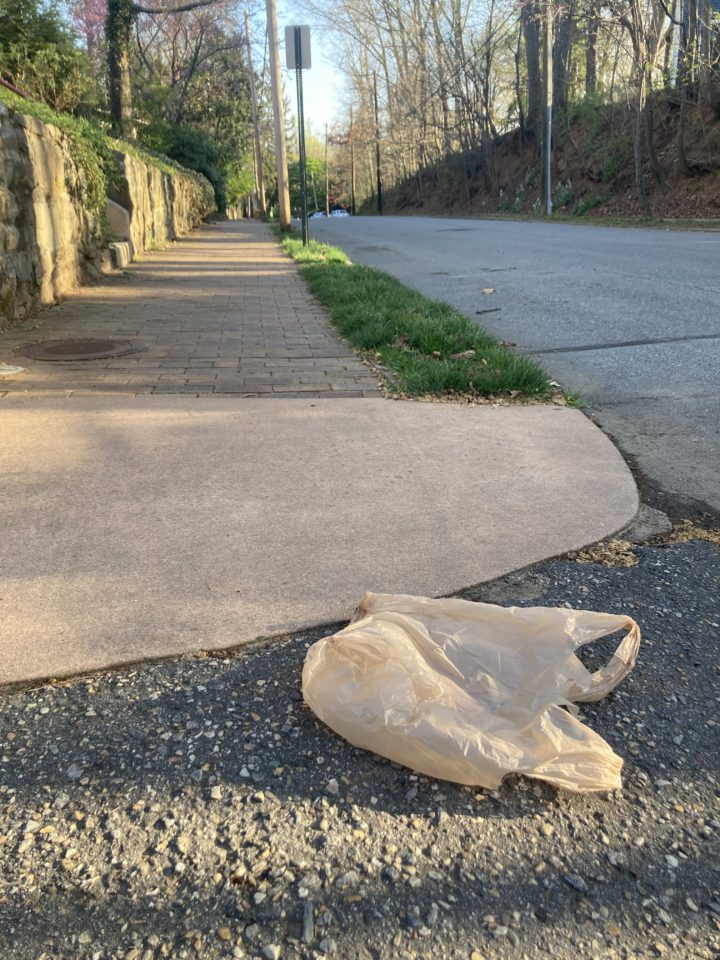It’s in the creek, on the street, beneath your river tube and even in your secret swimming hole. Plastic litter, from bottles to bags, is everywhere.
Local environmental nonprofit MountainTrue has been documenting that fact for years, and is renewing its push to get single-use plastic bags banned from Asheville.
“A third of microplastics we’re seeing in the French Broad watershed is coming from these plastics that we might use for 12 minutes and end up throwing away. So anything we can do to curb the input of that into our daily lives the better,” says Anna Alsobrook, watershed science and policy manager for MountainTrue.
The nonprofit is advocating for a full ban on single-use plastic bags given at point-of-sale and polystyrene foam to-go boxes, with an additional 10-cent fee on the use of replacement paper bags. They argue this would have the largest environmental benefit while only costing consumers a bit more than $3 annually on average in paper bag fees.
Customers using EBT, SNAP and WIC would be exempt from any fees under the proposal.
If passed, it would be the first time any city or county in North Carolina took action on plastic bags, although the General Assembly instituted a ban for the Outer Banks that was later repealed, and Durham is currently considering regulation. Many cities and counties around the country, including several in South Carolina, have instituted bans or fees.
Advocates of the ban say the convenience of single-use plastic is far outweighed by the risks of having plastic film so prevalent in our waterways and bodies. Microplastics are found in every sampling taken monthly at various sites around the French Broad watershed by MountainTrue, according to data they provided to Xpress.
“Plastic turns into microplastics, and we’re ingesting them in our human bodies every day. The health effects of the chemicals that go into making plastics are being linked to human health impacts. So the more plastics we put out into the world, the more microplastics we will be ingesting and the more health impacts we will see to our reproductive and nervous systems,” Alsobrook says.
The city of Asheville is conducting a plastic reduction survey of residents and businesses to determine the appetite for a ban, open through Sunday, April 30. Buncombe County has not yet considered any regulation, says Kassi Day, county spokesperson.
Free to use, expensive to produce
MountainTrue used national data from the American Chemistry Council — a group that lobbies against climate regulation on behalf of the petrochemical industry — to calculate the impact of a plastic bag ban locally. Considering Buncombe County residents use 132.4 million plastic and 8.2 million paper shopping bags a year, according to the study, a ban with a 10-cent fee on paper bags would reduce fossil fuel consumption by 86% and solid waste production by 66%, with significant reductions for sulfur dioxide and greenhouse gas emissions as well as freshwater and energy consumption.
This estimate is based on an assumed 10% increase of paper bags after a ban with a fee.
Alternatively, MountainTrue estimated that without a fee, paper bag consumption would go up 50%, resulting in a smaller but still significant impact, according to the study.
This data only takes into consideration the production costs of plastic bags, as it is difficult to quantify the environmental impact of bags after they enter the waste stream, Alsobrook says.

“The lightweight nature of plastic bags makes them more challenging to contain and keep in the appropriate waste stream. Plastic bags that are disposed of as trash, but that aren’t disposed of in a well-closed trash bag or container, or that are placed in an already overflowing container, can escape and become litter,” says Jes Foster, sanitation division manager for the city of Asheville.
It takes time and labor to clean up litter around the landfill and transfer station, primarily plastic bags. It’s estimated to take more than 1,200 hours and $21,000 worth of labor per year, according to the Buncombe County solid waste division, Foster says.
For similar reasons, single-use plastic bags are a burden at the single-stream recycling facility, Curbside Management.
“Plastic bags are a big problem for us. As the bags travel over our sort line, we must grab the bag, tear it open, shake it, and then dispose of the bag; 60 to 70% of what our sorters do on the line is pulling bags out of the recyclables,” says Nancy Lawson, co-owner of Curbside Management. “Not only do bags cause us great inefficiencies, but then we must bale the bag waste, and pay to dispose of them at the landfill,” she continues.
Curbie spends $10,000 a month in landfill fees just to dispose of plastic bags that are inappropriately put in recycling containers, Lawson says.
The bags are recyclable at retail stores that give them out, such as Ingles, Harris Teeter, Publix, Lowe’s home improvement and others. The bags must be completely clean to be recycled in bins at these stores, then they are sent to a facility in Virginia where plastic lumber is made out of them, Lawson says.

Officials at Ingles did not respond to a request for comment on the plastic bag recycling program or what a plastic bag ban would mean for business.
No matter if bags wind up in the landfill or as litter in waterways or alongside roadways, they never break down, Alsobrook says.
According to a study of Western North Carolina watersheds completed in March 2021 by MountainTrue, microplastics were found in every sample from every water body tested, with an average of 19 particles per liter. While microfibers from synthetic clothes and fishing line were the most common plastic found, microfilms — which degrade from plastic bags and plastic food wrappers — accounted for more than a quarter of the microplastics found.
“A lot of people would assume that if you took a water sample in the middle of the national forest it wouldn’t have any microplastics in it but that’s not the case anymore. These microplastics are carried by wind and dust and rain and weather so we have found them everywhere,” Alsobrook says.
Is a ban legal?
Asheville City Council member Maggie Ullman says she supports a ban in an email to Xpress, but wants to proceed with caution because of possible repercussions from the state.
“We need to balance the march towards progress with the threat of putting a target on our backs for the state legislature,” she writes.
In 2009, the General Assembly passed a bill banning single-use plastic bags on the Outer Banks. It was repealed in 2017, despite objections from the Dare County Board of Commissioners, several municipalities and the Outer Banks Chamber of Commerce, according to reporting by the Outer Banks Voice.
The N.C. Retail Merchants Association supported that repeal, and is against any government regulation of plastic bags.
“Municipalities get their authority from the General Assembly, and the General Assembly has not given any authority to regulate these items,” says Andy Ellen, president and general counsel of the merchants association.
“From the business perspective, we think that it ought to be a market-based decision for consumers on whether they would like a plastic bag or a paper bag, or whether they want to bring their own reusable bags. We just think that’s a better mechanism,” Ellen continues.
MountainTrue and the Plastic-Free WNC coalition, as well as Don’t Waste Durham, a group lobbying to place a fee on plastic bags in Durham, are using the N.C. Solid Waste Management Act to justify regulating the bags.
A white paper prepared by the Duke Environmental Law and Policy clinic argues the law compels local governments to take action to address deficiencies in service or disposal capacity to “meet local needs and to protect human health and the environment.”
“The N.C. Solid Waste Management Act not only empowers local governments to manage solid waste, but it impels them to take measures to reduce solid waste at the source. In addition, statutory grants of authority to local governments have to be interpreted broadly by N.C. courts,” says Susannah Knox, senior attorney at the Southern Environmental Law Center.
Ellen disagrees, saying that because single-use bags haven’t gotten to customers yet, they shouldn’t be considered solid waste, and can’t be regulated on those grounds.
“That’s like saying the city of Asheville can regulate lumber, or paint, or anything inside of a store that eventually ends up at the landfill. I mean, that’s the preposterous sort of argument that they’re using,” he says.
Ellen said he would consider a legal challenge if Asheville passed an ordinance banning or placing a fee on the bags. Knox knows that might come, but remains undeterred.
“We still think there is strong authority under state law as laid out in the Duke (white paper), and we haven’t seen any similar analysis from the (NCRMA) that would compel a different result,” she says.
Additionally, the Outer Banks ban repeal does not create legal precedence, Knox said, because it was initially imposed by the state legislature, and not a local governmental body, as the proposed bans would be.
Charleston bans the way
Isle of Palms, S.C., became the first in that state to enact a ban in 2016. Other municipalities quickly followed, and Charleston passed a similar ordinance in 2018.
Shortly after the ordinance passed, Charleston Waterkeeper Andrew Wunderley saw a noticeable decline in plastic trash in the marshes and rivers during cleanup missions.
“[Before the ordinance], you get into the marsh during cleanup, and all of what you’re picking up was plastic bags, and Styrofoam. A lot of plastic bottles and bottle caps and food wrappers, all that stuff. It’s all stuff that’s designed to be used one time and then discarded,” he says.
Wunderley says he has collected a lot of post-ordinance data about plastic found in the waterways, but he doesn’t have a lot of pre-ordinance data to compare it to.
“We knew it was a problem anecdotally from experience because we were out there doing it. We are finding a lot less [single-use plastics] now. From when I first started 11 years ago to now, we’re finding a lot less of it,” he says.
Foam is not your homie
As a part of this proposed ordinance, MountainTrue also is advocating for a ban on polystyrene foam, commonly referred to as Styrofoam, used for to-go food containers and cups.
The primary chemical component of Styrofoam — styrene — has been found to be carcinogenic by the National Institute of Health, and Alsobrook says that means it shouldn’t be anywhere near our food.
“[Styrene] can readily leach out into our takeout food, and then you’re ingesting it. So not only is it a huge litter problem and tied to the fossil fuel industry, but it’s a health issue because of this particular class of chemicals,” Alsobrook says.
Foam is also notoriously difficult to recycle, and Curbie does not accept it at its single stream facility. Henderson County residents can take their clean Styrofoam to the collection center on predetermined days after the county purchased a densifier to greatly reduce the volume of the foam, making it easier to ship to the recycler where it is converted into insulation, says Marcus Jones, engineer for Henderson County.
In Buncombe, GreenWorks accepts clean food-grade Styrofoam such as cups, egg cartons and clam shells as well as clean blocks of packing Styrofoam at their Hard2Recycle events — held occasionally at various locations around the county. Packing peanuts and soft foam are not accepted at these events.
Local perspective
The city of Asheville has been discussing regulation of plastic bags for more than a year. The Sustainability Advisory Committee on Energy and the Environment voted 5-2 to support a single-use plastic bag ban in July 2022.

In an effort to take a small step, Asheville City Council decided to first pass a ban on plastic bags for curbside leaf and brush collection that will go into effect in August 2023.
“I think a vast majority of the people of Asheville support a ban on single-use plastic bags, but there needs to be sensitivity in any transition to make sure that both store owners and operators as well as customers are aware of the change and are offered support,” says Mayor Esther Manheimer.
Based on live results on the city’s plastic reduction survey as of April 13, 88% of respondents support some kind of plastic bag ban. Of all survey respondents, 12% self-identified as business owners or representatives.
The survey is open until Sunday, April 30.
Thirty merchants in Biltmore Village signed a pledge to voluntarily discontinue the use of plastic bags in 2019.
Mark Harding, co-owner of the Village Wayside Bar and Grill, says he made the switch to paper in 2017, and it has been well worth the cost.
“I started to look at how the guest takes home our food. I wanted to make the dining experience just as enjoyable when they got home and unwrapped their to-go food. What are they going to do with ugly plastic bags? Paper looks better. It’s not necessarily cost motivated for us. It’s more about presentation,” Harding says.
Laura Rathbone, manager of the Olde World Christmas Shoppe in Biltmore Village, says she uses recycled plastic bags to help her customers take home the heavier festive wares she sells.
“It’s hard to find nonplastic bags that will support those items. I think it’s important that we address this and cut back on plastic consumption, but it will be a cost factor for us,” she says.
Kenny, manager at the South Slope Convenience store on Southside Avenue who requested that his last name be withheld, says the ban would affect his store tremendously because 99% of what he sells is carried out in plastic.
Kenny estimates it would cost $200-$300 extra a month for paper bags instead of plastic, and if not offered a bag, people will buy less.
Similarly, Ellen says single-store grocery retailers have reported spending four times more on paper or reusable bags than they did on plastic bags in places with a plastic bag ban.
Additionally, paper cups cost far more than the $2 Kenny pays for 25 styrofoam cups, and coffee prices might go up if they have to switch, he says.
“The convenience store business is a penny game. Our profit margin is pennies, not dollars. There’s a lot more things they should be focused on than hurting us, like mental health services,” he says.
Ellen says the thin margins also apply to grocery retailers. Ellen says when a ban went into place in Beaufort County, S.C., in 2018, a retailer with four locations reported an expense increase of about $28,000 in the first four months.
Cognizant of the effect on businesses, Karim Oleachea, MountainTrue spokesperson, says the organization has proposed working with local business owners on a bulk-buying initiative to help offset increased costs of paper products.
In Charleston, Wunderley says after the ban went into place concerns from the business community unsure of how it was going to work quickly went away.
“The minute those ordinances went into effect, everybody just figured it out within a month. And, you never heard those sorts of complaints again, about how we are going to figure out how to do this,” he says.
If the plastic bag option was taken off the table locally, Oleachea predicts that over time, we wouldn’t miss them, and the convenience of single-use plastic is a convenience we don’t yet realize is unnecessary.
“It ends up doing more damage to our society with the production of more plastic and more trash. The plastic industry has hooked us on unnecessary convenience,” he says.




Is this a joke? They just opened up one of the most beautiful and serene roads in the country to overuse and abuse by a gigantic warplane part factory but they are worried about plastic bags? This town is so pathetic.